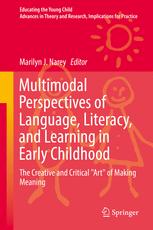

Most ebook files are in PDF format, so you can easily read them using various software such as Foxit Reader or directly on the Google Chrome browser.
Some ebook files are released by publishers in other formats such as .awz, .mobi, .epub, .fb2, etc. You may need to install specific software to read these formats on mobile/PC, such as Calibre.
Please read the tutorial at this link. https://ebooknice.com/page/post?id=faq
We offer FREE conversion to the popular formats you request; however, this may take some time. Therefore, right after payment, please email us, and we will try to provide the service as quickly as possible.
For some exceptional file formats or broken links (if any), please refrain from opening any disputes. Instead, email us first, and we will try to assist within a maximum of 6 hours.
EbookNice Team

Status:
Available0.0
0 reviewsOur image-rich, media-dominated culture prompts critical thinking about how we educate young children. In response, this volumeprovides a rich and provocative synthesis of theory, research, and practice that pushes beyond monomodal constructs of teaching and learning. It is a book about bringing “sense” to 21st century early childhood education, with “sense” as related to modalities (sight, hearing), and “sense” in terms of making meaning. It reveals how multimodal perspectives emphasize the creative, transformative process of learning by broadening the modes for understanding and by encouraging critical analysis, problem solving, and decision-making.
The volume’s explicit focus on children’s visual texts (“art”) facilitates understanding of multimodal approaches to language, literacy, and learning. Authentic examples feature diverse contexts, including classrooms, homes, museums, and intergenerational spaces, and illustrate children’s “sense-making” of life experiences such as birth, identity, environmental phenomena, immigration, social justice, and homelessness.This timely book provokes readers to examine understandings of language, literacy, and learning through a multimodal lens; provides a starting point for constructing broader, multimodal views of what it might mean to “make meaning;” and underscores the production and interpretation of visual texts as meaning making processes that are especially critical to early childhood education in the 21st century.